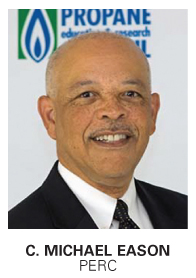Friday, January 13, 2017
(January 13, 2017) — The U.S. Department of Transportation (DOT) has published a final rule detailing minimum training requirements for commercial drivers’ license (CDL) applicants and CDL holders who seek endorsements, including the hazardous materials endorsement, reports the National Propane Gas Association (NPGA). The compliance deadline is Feb. 7, 2020. Therefore, those seeking a CDL or an endorsement after that date must complete the recently published minimum training requirements before taking the CDL exam or endorsement exam.

 C. Michael Eason has joined the Propane Education & Research Council (PERC; Washington, D.C.) staff as director of budget and finance. He will replace Jim Harris, PERC’s CFO and vice president of administration for the past 11 years, who will retire at the end of 2016. Most recently, Eason was CFO at Intelligent Transportation Society of America.
C. Michael Eason has joined the Propane Education & Research Council (PERC; Washington, D.C.) staff as director of budget and finance. He will replace Jim Harris, PERC’s CFO and vice president of administration for the past 11 years, who will retire at the end of 2016. Most recently, Eason was CFO at Intelligent Transportation Society of America.